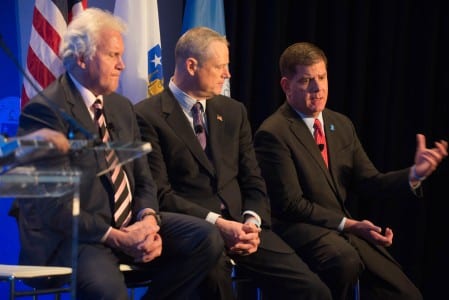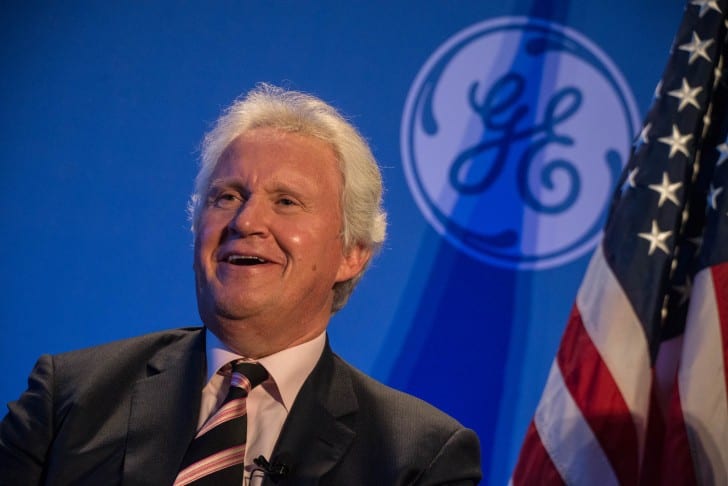
Photo by Derek Kouyoumjian
April 8, 2016
BY JASON PRAMAS @JASONPRAMAS
General Electric brass, pols celebrate government giveaway while public opposition grows
While General Electric CEO Jeffrey Immelt, Massachusetts Gov. Charlie Baker, and Boston Mayor Marty Walsh cavorted with assorted political and business glitterati on the 33rd floor of the 60 State Street tower this week—celebrating the seeming fruition of the deal they cut last fall with zero public oversight— about 75 activists representing 36 community organizations picketed outside in the driving snow to criticize the $270 million-plus in state and city tax breaks, direct aid and services being lavished on the $117 billion multinational in exchange for moving its headquarters to Boston.
According to one of the organizers, Eli Gerzon of Jewish Voice for Peace-Boston, the reason for the rally was simple, “This GE deal is a clear example of supporting abusive corporations instead of human beings … The idea that it will help everyday people is just the same old trickle-down economic logic that has failed us over and over. We’re not falling for that again. We need our budget and public funds to support human beings: public transportation, local good paying green jobs, schools, and housing. We don’t want to invest in a company that pollutes rivers in Massachusetts, dodges taxes, and builds warplanes used against Palestinians and other people of color around the world.”
Meanwhile, GE leadership thought it was appropriate to show a video at their event lauding the city’s “bold innovative thinkers” by calling out Malcolm X, Phillis Wheatley, Susan B. Anthony, Ralph Waldo Emerson, and Walt Whitman. Famous radical agitators and intellectuals who probably would have all joined the protesters had they been alive.

Photo by Derek Kouyoumjian
In the March 25 installment of this Missing Manual, I predicted that the inevitable GE charm offensive aimed at attempting to placate increasingly perturbed locals would begin by spreading some money around town. And said that nonprofit organizations should refuse to take funds from a criminal corporation that ruined the lives of tens of thousands of poor families by selling them subprime mortgages, helped cause the 2008 financial collapse by selling toxic derivatives based on said mortgages, got bailed out by the feds (who changed the rules just for them), stole untold millions in a years long municipal bond scam, and avoided paying billions in taxes by—among other tricks— offshoring their profits (just like those nice Russian gentlemen we’ve been hearing about in the Panama Papers scandal). A position I stand by.
True to form, this week’s festivities began with the announcement of GE’s plan to donate $50 million to Boston schools, community health centers, and job training programs. But not all at once. Over five years. So, roughly $10 million a year. Looking under the hood of the official press release announcing the minor allotment from the company’s huge and growing PR budget—$393 million in 2014 according to AdAge, over $50 million on digital media alone in 2015 according to Kantar Media—the funds will likely benefit GE more than anyone else.
Here are a few illustrative quotes followed by my commentary:
Boston Public Schools (BPS): GE will reach 100 percent of Boston Public Schools high school students each year through our career labs, computer science courses, and high school design experience to prepare tomorrow’s workforce, by committing $25 million. The donation will provide students the opportunity to explore college and career possibilities, and to understand the skills necessary for future employment. GE will also create “GE Brilliant Career Labs” with both physical and virtual locations to allow students a unique hands-on experience with advanced manufacturing technology and software to assist them through career planning and internships. GE will also assist 100 percent of STEM high school teachers, to better prepare students for college and their future careers.
All roads here lead to GE polishing its tarnished image. The company’s goal being to look like it supports public education while donating less to BPS over the next five years than the $32 million the city is cutting from its budget next fiscal year alone. And at the end of the day, they’re not actually promising BPS students training that will lead to jobs at GE. Just the opportunity “to understand the skills necessary for future employment.” Which means what exactly? Understanding that you’ll either need to be a manufacturing robot in some zero regulation foreign Export Processing Zone, or a white, wealthy, Ivy League-trained manager in the Boston HQ to have a job with GE in the future? Sad.
Boston Community Health Centers (CHC): GE will commit an additional $15 million to developing, and expanding the skills of health care providers at critical Community Health Centers in underserved communities. This will include training in the use of technology, leadership skills, and increased access to specialty care, in order to deliver better treatment for common, complex medical conditions like cardiovascular disease and addiction. The Developing Health Boston program will initially support 22 Boston area CHCs and will provide skills training to more than 75 percent of CHC leaders, health care providers, and staff. As well, GE Foundation partners will help to develop next generation health care workers.
“Next generation health care workers?” More robots. Maybe they’ll revolt like in The Matrix or something. Regardless, it’s frankly insulting to talk about “expanding the skills of health care providers at critical Community Health Centers in underserved communities.” In Boston. Which has some of the best medical training programs in the world. What’s needed is for GE and corporations like it to pay the taxes they owe; so that Community Health Centers—and the US health system in general—no longer have to struggle for needed funds to provide top flight medical care to everyone. Preferably through a new national health program that expands Medicare to cover the entire US population.
Building the Diversity Pipeline: GE has also pledged $10 million to increase the capabilities and outcomes for our diverse students. GE will leverage its employees and leaders to provide training, access to manufacturing labs at GE Garages, and externships for underserved populations outside of the Boston Metro area, including Lynn and Fall River.
Result? GE will fail to provide jobs for “diverse students” from the cities and towns they screw over by not paying taxes.
And what of all those new jobs GE recently claimed would materialize in Boston because of their presence here?
According to an economic impact study conducted by Oxford Analytic, GE’s move adds 4,000 new jobs in the Boston area, between temporary construction jobs and permanent GE employees and vendors ….
This explains why the construction unions predictably haven’t uttered a peep of criticism of the deal—nor have any unions except the ones that used to have lots of members at the plants that GE shut down over the last few decades. As GE Lynn union leader Pete Capano presciently stated after the announcement of the GE Boston deal in January, “There will be more … donations to charity, that allows them to lay us off without looking bad.” Many of the “4,000 new jobs” will be short-term (and presumably unionized) construction jobs building the new HQ. Which could be seen as a fat paycheck for Marty Walsh’s supporters in the Boston Building Trades Council. The rest will be some new jobs at any GE facility in the “Boston area” (i.e., Massachusetts), and some “vendors”—a category which can include any number of low-wage jobs like delivery people. Not very impressive.

Photo by Derek Kouyoumjian
After the press release, the dog-and-pony show began in earnest.
Just before the big soiree, Immelt told the Boston Herald, “Let’s say we’re here for another 40 or 50 years in Boston. Whatever we got in incentives, no one remembers. This is really about the vibe. It’s really about being part of a vibrant community, us adding to the community. So if you don’t feel that when you come, it’s bad to bet on that happening at some point down in the future.”
Ah yes, “the vibe.” GE isn’t coming to Boston because of “incentives” like potentially not having to pay rent on the buildings the Boston Redevelopment Authority is buying on its behalf. Perish the thought. It’s “really all about being part of a vibrant community.” And about the public forgetting such “incentives.” And not guaranteeing that GE HQ will stay in Boston for any specific length of time.
The 60 State Street event featured much more of the same kind of airy rhetoric. But Immelt felt it necessary to nod to the protestors, as recounted in CommonWealth magazine. Perhaps because he found himself on the defensive regarding the public giveaways in nearly every interview he’s given lately.
“ … I empathize with the people that are outside, particularly today. They have to be dedicated.”
The protesters, as the early voice of rising public discontent with the GE Boston deal, were having none of it—issuing a clear warning to the politicians who brokered it over the heads of area working families. Horace Small of the Union of Minority Neighborhoods, who emceed the street rally, said, “Mayor Walsh and Governor Baker needs to understand they need to support people not rich white guys and corporations.”
True that.

Apparent Horizon is syndicated by the Boston Institute for Nonprofit Journalism. Jason Pramas is BINJ’s network director.
Copyright 2016 Jason Pramas. Licensed for use by the Boston Institute for Nonprofit Journalism and media outlets in its network.